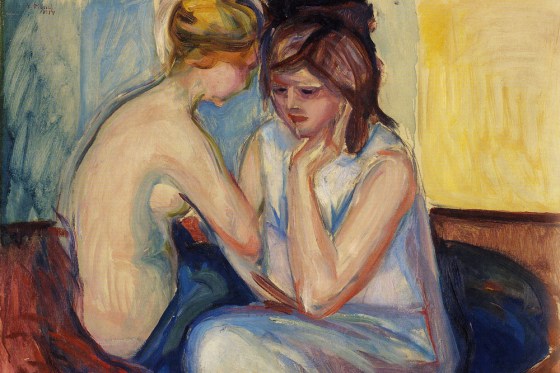Issue 13 | December 2025 Welcome to the thirteenth issue of Exordium, the University of Queensland’s student philosophy e-journal. This…
Quietist Speech and the Phenomenological Sign
Ludwig Wittgenstein offers a novel and cutting criticism of philosophical realism. The ‘quietist’ critique finds fault with the discipline’s misuse of concepts outside of their relevant ‘language games.’ Instead, it calls for a philosophy that forgoes positing any form of explanation and, in lieu of doing so, limits itself to pure description. In practice, this is often taken up by withholding any positive theses about the ontological ‘state of things,’ and simply stating things ‘as they are.’ In this essay, Mikel van Dyken extends upon John McDowell’s and Paul Davies’ proposals of Immanuel Kant and Edmund Husserl, respectively, as philosophers who manage to avoid the quietist critique. Van Dyken argues that while Kant and Husserl are largely successful in constructing a purely descriptive philosophy, they each make certain dogmatic explanatory assertions. Van Dyken then proposes Merleau-Ponty’s analysis of the lived experience of the world as a productive philosophy which succeeds in avoiding the quietist critique.
Faith: Eschatological Hope and the Absurd
Kierkegaard’s treatment of the Akedah in Fear and Trembling has caused consistent confusion for ethicists and existentialists alike. In this essay, James Patterson advocates a reconsideration of the universal and absolute in Kierkegaard’s theory, and a subsequent criticism of 20th century responses. The inner workings of Abraham’s mind are a mystery to us, but we must take Kierkegaard’s attempt to unravel this display of faith seriously. Readings posited by Levinas and Derrida show compelling responses to Kierkegaard, however, they ultimately fail to realise the significance of eschatological hope – a state of mind that embraces a teleology founded on absurdity. Viewing faith as a function of eschatological hope is necessary to fully appreciate how belief sits not alongside, but above ethics.
When Freedom Learns to Bend: Adaptive Preferences and the Politics of Autonomy
This article examines the relationship between autonomy and adaptive preferences, arguing that prevailing philosophical accounts, such as those of Serene Khader and Natalie Stoljar, treat adaptive preferences too superficially. Standard approaches, such as those advanced by Khader and Stoljar, tend to frame adaptive preferences as either impairments of autonomy or as incompatible with basic flourishing. Drawing on cases of intimate partner violence (IPV), Sithara-Anne French exposes a key oversight in these models: the failure to account for the complex interplay between oppression, internalised stereotypes, and preference formation. While Stoljar’s psychological processes model recognises how oppressive contexts undermine critical reflection, French argues that it does not fully address the deep psychological harms such contexts produce. Similarly, she contends that Khader’s focus on expanding options overlooks how internalised oppression can obscure the perceived value of alternatives. French proposes an expanded framework for understanding adaptive preferences, one that recognises the unconscious mechanisms by which oppression shapes desires, while preserving respect for victims’ agency.
e-Withering: A Diachronic Analysis of Auratic Art in the New Age of Film and Livestreaming
In this essay, Xavier Woodgate argues against Walter Benjamin’s claim that film, as a mechanically reproduced work of art, no longer possesses an ‘aura’, and that, rather, having left the spotlight of contemporaneity that Benjamin thought of film in, it has achieved a historicity that has established an ‘aura’ for film. However, Woodgate does not eschew Benjamin’s claim against the loss of aura in mechanically reproduced works entirely, and he maintains it against some contemporary developments in the mechanical reproduction of art through a diachronic analysis of the evolution of film into livestreaming.
Between Seeing and Being Seen: Rembrandt’s Self-Portraiture and the Ethicality of Vision
This essay explores the Dutch Golden Age painter Rembrandt Harmenszoon van Rijn’s self-portraits from both an art historical and philosophical perspective. In this essay, Andrew Millar argues that rigorous art historical analysis that situates Rembrandt’s self-portraiture within a blossoming, observable art historical tradition intersected with market demands and historically accurate trends in art does not exclude their philosophical, psychological analysis as some art historians claim. Rather, Millar draws from phenomenological art historical methods to argue that Rembrandt’s portraits function as an exploration and disclosure of the acts of seeing and self-recognition.
Conspiratorial Thinking: Can Alternative Facts be a Philosophical Position?
Science, and the epistemological position of scientific realism, hold a privileged position in culture, politics, and philosophy. The proliferation of science-oriented conspiracy theories, appears initially, to be a critique of this privileged position, akin in many ways to philosophical critiques, found in scepticism and quietism. However, conspiracy thinking critiques who holds privileged access to the external world, rather than there being access to a mind-independent world (scepticism), or the use of scientific thinking in philosophy (quietism). Victoria Lawson argues that science-based conspiracy theories, using Naomi Klein, are a political, not philosophical, critique of modern culture. Inside a given conspiracy-theorist denial claim – this scientific fact is incorrect – is a separate claim, that the scientist is ‘lying to them.’ This accusation of deceit is a denial that scientists are communicating to us, an accurate account of the world, which, we do feel unsettled by.
In the Shadows
Inspired by philosophers such as Sartre, Kierkegaard, and Kafka, this literary work explores key themes of Existentialism and Absurdism, uniting them to question what it truly means to live a meaningful life and whether the search for meaning can ever be a productive pursuit. Through the eyes of the protagonist, Thomas, the reader experiences the same torment that arises from this struggle. The work explores nihilism and despair, yet the conclusion seeks to uncover a more hopeful path, one that encourages a renewed pursuit capable of uplifting the reader and those who have faced, or are facing, thoughts of suicide.
Extending Adorno: The Culture Industry, Literature, and Language
While the majority of Theodor Adorno and Max Horkheimer’s ‘The Culture Industry’ presents a diagnostic account of the culture industry’s institutionalising sameness as a by-product of modern capitalism, the final section undergoes a rapid and distinct turn towards linguistic analysis. In this essay, Melinda Herman argues that this shift in analytical target indicates a deeper relationship between the culture industry’s ubiquity and its effect on language – one that can be expanded upon to account for literature’s position in modern society. To do so, Herman extracts a holistic account of language under capitalism from ‘The Culture Industry’ and Adorno’s broader philosophy of language, arguing that the culture industry’s self-supporting sameness translates into a degradation of language’s meaning-making capacity. Words function representationally, designating things, not meaning. From this standpoint, Herman introduces an obscure essay by Adorno that ties literature’s formal function to its description of subjectively lived specificity. Herman concludes that this role is deeply problematised by hegemonic sameness that reduces the meaning-making capacity of language to a hollow representationalism at direct odds with its artistic function.
Are Women and the Poor Competent Voters? Active and Passive Citizens in a Kantian State
In this essay, Emma Fensom examines Immanuel Kant’s distinction between active and passive citizens within his rightful state. In particular, Fensom focuses on whether such distinction can justify denying suffrage to those deemed ‘dependent’, and thus passive within society. Ultimately, Fensom finds Kant’s distinction to be arbitrary and grounded in prejudice. Further, she argues that a Kantian state will never be able to create the necessary conditions for those deemed passive to become active, where it cannot be guaranteed that active citizens will always vote in accordance with the general will.
Contents: Issue 12
December 2024
Fragmentary Subjectivity and the Evolution of the Museum: Examining Walter Benjamin’s “The Work of Art in the Age of Mechanical Reproduction”
This essay examines Walter Benjamin’s text, “The Work of Art in the Age of Mechanical Reproduction” (1935) to explore how technological advancement transformed the socio-political function of art and severed its ties to religious tradition. Benjamin identifies the degradation of art’s ‘aura’ as a casualty of these changes. I review how Benjamin defines aura, as a sensation connected to art’s cult value, before considering the political implications of its decay. I demonstrate how mechanical reproduction fundamentally altered art’s function to enable a fragmentary construction of subjectivity. I then draw on Rosalind Krauss’ essay, “The Cultural Logic of the Late Capitalist Museum” (1990), to demonstrate the cultural changes predicted by Benjamin decades earlier. Specifically, how the degradation of ‘aura’ led to a radical restructuring of the museum as a site which produces identity, moving from a temporal to spatial organising principle to accommodate a radically contingent and embodied subject.
Facing the Crisis of Democracy: Jacques Derrida, the Trump Era, and ‘Democracy to Come’
In this essay, I utilise Derrida’s framework of ‘autoimmunity’ to argue that the political collapse of the United States reaffirms that democratic structures are ‘to come,’ for democracy perpetually threatens its very existence. To frame this argument, I foremost describe Derrida’s account of autoimmunity, which details the ‘death drive’ of democratic structures in remaining open to self-critique. Further, the democratic pursuit of perfectibility ensures that democracy is perpetually to come. Derrida’s framework is then utilised to describe the current collapse of democratic structures within the United States to reaffirm the aporetic nature of democracy. Given the recent presidential election—and breaches of democratic proceedings which are occurring globally—this is a timely philosophical piece. Although the collapse of democracy has left many feeling despondent, Derrida provides a philosophical framework to both rethink democratic frameworks, and the possibility for society to move forward in the face of such crises.
Reading The Arcades Project, Practicing History
This essay presents a reading of Walter Benjamin’s Passagen-Werk in English translation as The Arcades Project. I focus on the work’s form and Benjamin’s theses on the construction of history. I begin by contextualising the work and then offer a “naïve” reading, considering the work’s presentation and implications read without Benjamin’s self-reflective theoretical context. I then engage with this more theoretical material to further develop the implications of my first analysis. I argue that the work exemplifies a method of writing history, by virtue of its specific fragmentary structure and Benjamin’s writings in Convolute N. I conclude with some reflections on other art historical theories and their interaction with Benjamin’s characterisation of historical perception, suggesting that The Arcades Project offers a novel historical methodology applicable to the writing of art history.
Diachronic Sameness and Temporal Parts or: How I Learnt to Stop Worrying and Love the Time-Slice
In this essay, I analyse the relationship between time and change and its bearing on identity. In particular, I focus on the way in which I believe temporal change is best understood as a matter of change in temporal parts rather than as occurring to a single entity which endures temporal change. To argue this, I establish the two main ideas of temporal change, before focusing on the work of David Lewis and his four-dimensionalist account of change. I then contrast his work in light of major criticisms from other thinkers. Finally, I argue that Lewis’ view can be successfully defended against these critiques and is able to serve as a useful way to understand the relationship between time and identity.
In the World: A Stroll Between a Vanishing Self, Doubt and God
Kitarō Nishida and Keiji Nishitani were Japanese philosophers associated with the Kyoto School, a movement that sought to integrate Eastern and Western philosophical traditions. Nishida, the founder of the school, focused upon the concept of a negated sense of self and emphasized the philosophy of nothingness. Nishitani, a student of Nishida, expanded upon these ideas by exploring the existential and religious dimensions of nothingness, significantly advancing the dialogue between Zen Buddhism and Western existentialism. This article explores how the logic of contradiction underpinning Nisihida’s work first leads to nothingness through self-negation and subsequently to encounters with a true sense of self. It also considers the crucial question of whether these experiences are religious.
What is the Dialectic? A Guide for the Perplexed
Today, even among many students of philosophy, the notion of dialectics remains enigmatic. In this essay, I aim to dispel this mystery by elucidating the dialectic’s original context in the work of Immanuel Kant. First, I clarify Kant’s solution to David Hume’s critique of inductive reasoning. In particular, I emphasise the limits that Kant imposes on cognition through reference to his basic epistemological terminology and the transcendental analytic. This account of cognition contextualises his later arguments in the transcendental dialectic, where I identify the tension within his notion of the limits of reason that ultimately gives rise to the dialectic. Second, I briefly discuss some common misconceptions and contemporary examples of the dialectic to demonstrate its enduring significance for us today.
Totalitarianism and the Failure to Think: Arendt’s Banal Evil and Intersubjective Taste
In this essay I offer a critique of Hannah Arendt’s views on ethics, thinking, and moral taste. Following the atrocities of the twentieth century, she positions her theory as a preventative defence against the ‘banality of evil’, especially in cases of totalitarian rule. For Arendt, prevention of such evil requires a combination of reflective thinking and a sense of moral taste which is dependent on one’s community. I critique this notion, arguing that it is the very intersubjectivity of taste that permits moral corruption. In both totalitarian states, and increasingly in insular online communities, people are not afforded the diversity of alternative viewpoints to develop an effective sense of judgment. I argue that Arendt’s theory requires some incorporation of practical reason if it is to successfully prevent this banal evil.

















